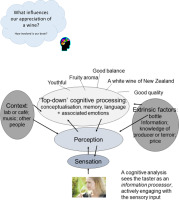当前位置:
X-MOL 学术
›
Food Res. Int.
›
论文详情
Our official English website, www.x-mol.net, welcomes your feedback! (Note: you will need to create a separate account there.)
Demystifying wine tasting: Cognitive psychology's contribution.
Food Research International ( IF 8.1 ) Pub Date : 2018-03-21 , DOI: 10.1016/j.foodres.2018.03.050 Wendy V Parr 1
Food Research International ( IF 8.1 ) Pub Date : 2018-03-21 , DOI: 10.1016/j.foodres.2018.03.050 Wendy V Parr 1
Affiliation

|
Over recent decades, cognitive psychology has made a significant contribution to our understanding of wine-tasting phenomena. At the most fundamental level the discipline's contribution has made us aware that even an apparently 'simple' judgment, such as noting that a wine's odour reflects over-ripe fruit, involves not just our nose but sophisticated cognitive processing. With its information-processing model of how people interact with their surrounding world, and its methodologies and theories regarding how we perceive, conceptualise, remember, image, make judgments, and communicate our experiences, cognitive psychology has markedly advanced our understanding of wine tasting and wine tasters. This review highlights notable wine sensory research outcomes that make evident the importance of a taster's cognitive processes in their wine analysis and appreciation. These include data providing evidence for colour-flavour perceptual bias, prototypical thinking, knowledge-based wine judgments, the close links between olfactory memory, autobiographical memory and emotion, and the notion of wine expertise. Further, it will be argued that such data demonstrate how a consensus model, still dominant in much wine sensory analysis, is limited at best and inappropriate for sensory analysis of complex products such as wine in many contexts. Critical to this argument is appreciating that differences amongst tasters, reflecting each individual's physiology, experience and knowledge, are valid data in themselves rather than 'error in the machine' as they were conceptualised within traditional consensus models of sensory analysis. The article terminates with reference to a promise for even greater understanding of wine tasting phenomena that the future offers by links between cognitive psychology's behavioural data and recent technological advances in neuropsychology and neurophysiology (e.g., cerebral imaging techniques).
中文翻译:

揭开品酒神秘面纱:认知心理学的贡献。
在最近的几十年中,认知心理学为我们对品酒现象的理解做出了重要贡献。在最基本的层面上,该学科的贡献使我们意识到,即使是表面上“简单”的判断,例如指出葡萄酒的气味反映出未成熟的水果,也不仅涉及我们的鼻子,还涉及复杂的认知过程。凭借其关于人们如何与周围世界互动的信息处理模型,以及关于我们如何感知,概念化,记住,形象化,做出判断和交流我们的经验的方法论和理论,认知心理学显着地增进了我们对品酒和饮酒的理解。品酒师。这篇评论重点介绍了明显的葡萄酒感官研究成果,这些成果明显证明了品酒师的重要性。葡萄酒分析和欣赏过程中的认知过程。这些数据包括为色香味觉偏见,原型思维,基于知识的葡萄酒判断,嗅觉记忆,自传记忆和情感之间的紧密联系以及葡萄酒专业知识的证据提供证据。此外,将争辩说,这样的数据证明了在很多葡萄酒感官分析中仍占主导地位的共识模型是如何在最大程度上受到限制并且在许多情况下不适用于复杂产品(如葡萄酒)的感官分析。该观点的关键在于,欣赏者之间的差异反映了每个人的生理,经验和知识,它们本身就是有效数据,而不是“感官错误”,因为它们是在传统的感官分析共识模型中概念化的。
更新日期:2018-03-21
中文翻译:

揭开品酒神秘面纱:认知心理学的贡献。
在最近的几十年中,认知心理学为我们对品酒现象的理解做出了重要贡献。在最基本的层面上,该学科的贡献使我们意识到,即使是表面上“简单”的判断,例如指出葡萄酒的气味反映出未成熟的水果,也不仅涉及我们的鼻子,还涉及复杂的认知过程。凭借其关于人们如何与周围世界互动的信息处理模型,以及关于我们如何感知,概念化,记住,形象化,做出判断和交流我们的经验的方法论和理论,认知心理学显着地增进了我们对品酒和饮酒的理解。品酒师。这篇评论重点介绍了明显的葡萄酒感官研究成果,这些成果明显证明了品酒师的重要性。葡萄酒分析和欣赏过程中的认知过程。这些数据包括为色香味觉偏见,原型思维,基于知识的葡萄酒判断,嗅觉记忆,自传记忆和情感之间的紧密联系以及葡萄酒专业知识的证据提供证据。此外,将争辩说,这样的数据证明了在很多葡萄酒感官分析中仍占主导地位的共识模型是如何在最大程度上受到限制并且在许多情况下不适用于复杂产品(如葡萄酒)的感官分析。该观点的关键在于,欣赏者之间的差异反映了每个人的生理,经验和知识,它们本身就是有效数据,而不是“感官错误”,因为它们是在传统的感官分析共识模型中概念化的。



























 京公网安备 11010802027423号
京公网安备 11010802027423号